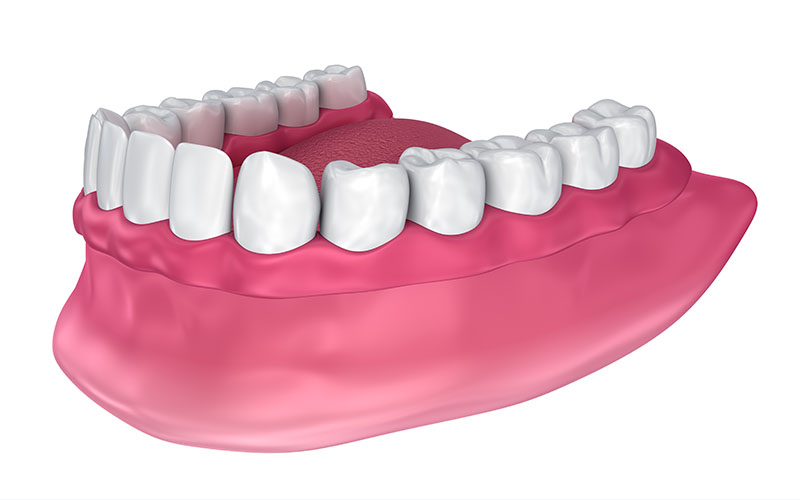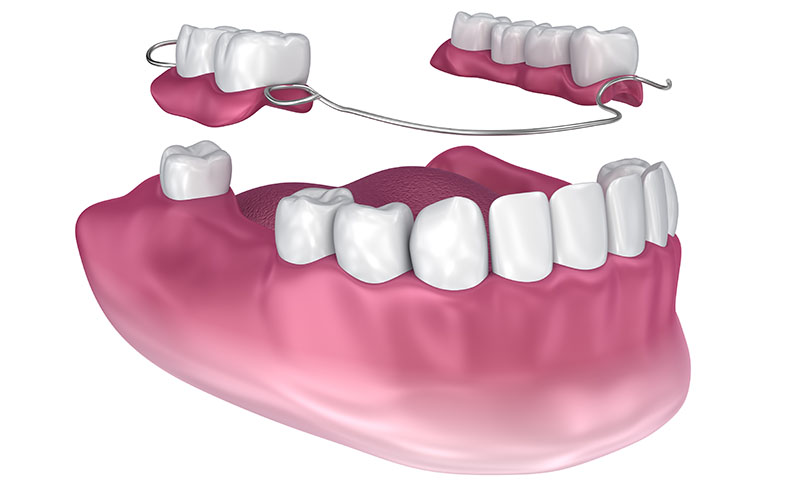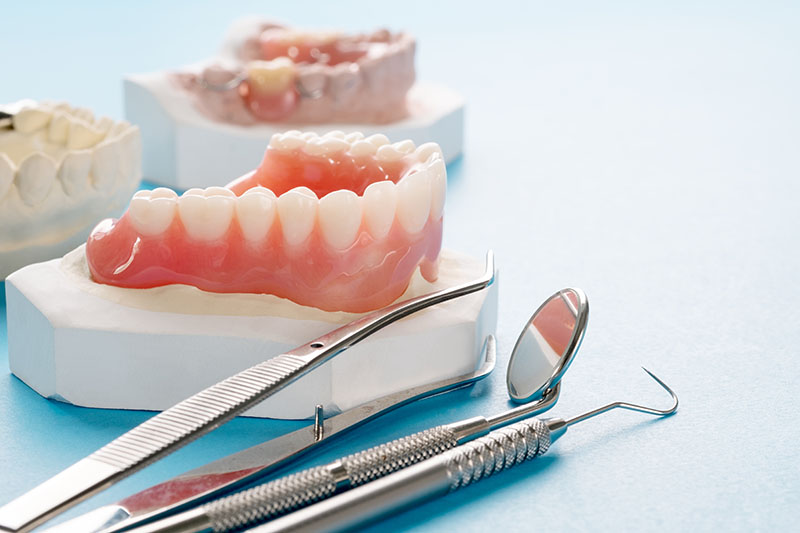Dentures
What Are Dentures?
Dentures are removable prostheses, an alternative treatment used to replace missing teeth. It’s also known as false teeth. It consists of a set of artificial (usually acrylic) teeth bonded to a plastic or metal base. Dentures are designed to be a removable tooth replacement option. When the wearer desires, for example, for hygiene reasons, they can typically be withdrawn from the mouth.
Dentures are an excellent restorative alternative in circumstances when both missing teeth and significant deficiencies of tooth-supporting tissues need to be replaced. The dimensions of a denture can perfectly replace missing teeth, gum tissue, and jaw bulk, plus filling out the shape, profile, and volume of the face, lips, and smile.

Types
What Are the Types of Dentures?
There are two types of dentures as follows:
- Complete Dentures: Complete dentures are created for patients who have lost all of their teeth on either the upper part of the lower part of the jaw. Complete dentures also have two types: “conventional” or “immediate“. Conventional dentures are made after the teeth have been removed and the gum tissues have healed, which takes about 8 to 12 weeks from the date of the teeth’s removal or extraction. Immediate dentures, however, are placed as soon as the teeth are removed, as these dentures are made in advance. Immediate dentures are placed as soon as the patient’s teeth are removed. While this could be an advantage aesthetically, the downside is that it may take several adjustments to fit properly, as gums and bones have a tendency to shrink during the healing process. Immediate dentures are mostly considered temporary solutions to complete dentures.
- Partial Dentures: Partial dentures are made for patients who have one or more missing teeth. These dentures are usually clipped through metal clasps and can be easily unclipped or removed conveniently. The replacement teeth are held together by a metal framework attached to a plastic base, which is designed to be adaptable to the natural teeth and conveniently removable. Crowns are placed on the teeth on either side of the gaps, which are then joined by the replacement teeth to fill in the gaps.


Procedure
What Is the Procedure for Getting Dentures?
The following is a step-by-step procedure of what commonly happens when getting dentures:
- Step 1 – During the first visit, your dentist will ensure that your gums and tissue are healthy and ready for the adjustment of the placement of new teeth. This will involve initial check-ups and exams, including x-rays to check for potential issues with the underlying bones. Other procedures might be done to ensure that a safe and comfortable denture will be fitted. During this visit, the impression of the cast or mold of the dentures will be made as well. At this visit, the dentist will also discuss the essential details of the dentures with you.
- Step 2 – The next visit will determine the length of the replacement teeth. Through a series of assessments, your dentist will determine if the denture is fitted properly and whether it is aligned properly between your upper and lower teeth. A loose-fitting denture will be placed to measure the accuracy of the position of the teeth. This is done to make sure that the bite is comfortable and that it works well.
- Step 3 – In the third step, the loose dentures will be replaced with the final set of plastic teeth. While it will look like the actual denture, expect the teeth to be in wax as the set will still be prepared for the final adjustments before being in the final plastic.
- Step 4 – The final visit will be the installation of your new dentures, as well as a post-assessment by your dentist on how to properly take care of your dentures to make them last.
Alternatives
What Are the Alternatives to Dentures?
If you’re looking for other options for tooth replacement, there are several alternatives to dentures available, which include:
- Implant: An implant consists of a metal post that is instilled into the bone of your jaw. The post will be attached with a crown to replace the missing tooth. It can also be used to replace several teeth through the use of a bridge. Other types of implants include all-on-4 dental implants. Implant-supported dentures are also one of the options available.
- Bridge: A bridge is a dental option to replace missing teeth by placing crowns on the teeth beside the gap and then placing the artificial teeth over the gap, supported by the bridge. The bridge is fixed in place using dental cement, making it a permanent option. A dental implant bridge is a more modern way to do this treatment, and it is stronger and lasts longer.
Cost
How Much Would Getting Dentures Cost You?
Dentures are custom-made for each patient, so the cost would be different for each case. Other cost-related considerations include the type of dentures you will receive, your location, and insurance considerations, among others. To get a more accurate quote, you can reach us here or fill out this form:

Materials
What Are the Materials Used for Dentures?
Dentures are made from various types of materials and it will be determined by your dentist which one best suits your needs. These types include:
- Acrylic: Acrylic is a gum-like material commonly used for partial dentures due to its flexibility for molding and its durability.
- Metal: Metal material is a combination of cobalt and chromium but is adjusted with colors matching the teeth and gums for a natural-looking appearance. Since both the teeth and the base are made of metal, it is also a durable option for dentures.
- Flexible: Flexible materials for dentures consist of nylon, polyester, polycarbonates, and polypropylene. This is an innovative option because of the advanced benefits it provides for the patient, such as being less prone to allergic reactions, having inbuilt, natural-looking hooks for comfortability and convenience, and more.
What Are Denture Adhesives and Their Types?
Also known as “denture glue,” denture adhesives are used to keep the dentures in place, providing a stronger hold, especially for those that have become loose over time. There are several types of denture adhesives available:
- Adhesive Creams: This type of adhesive is for wet dentures and can provide a strong hold while also sealing other materials, such as food, from damaging the denture’s durability. Creams usually come in tubes with a maneuverable tip that allows you to easily put on the adhesive.
- Adhesive Powder: Adhesive powders can hold the denture for up to 12 hours and are easier to remove. This is a popular choice for patients who are uncomfortable with wet denture adhesives.
- Adhesive Strips: Adhesive strips are also a popular option due to their convenience and durability. These adhesives last throughout the day and don’t affect your comfortability at all.
Risks
What Are the Risks of Getting Dentures?
As with any treatment, you may experience some initial discomfort after fitting your dentures. While your dentist will always ensure a safe and pain-free procedure, some complications you may encounter include swelling, bleeding gums, discomfort due to unfit dentures, and loose teeth, among others.
Are Dentures Repairable?
Dentures are usually repairable, especially if the damage is caught early on. Relining, or basing, is a process where back material is added to enhance the fit of the denture to your liking. However, if the damage is severe, it may not be repairable anymore. The best thing to do is to consult with your dentist as early as possible to prevent further damage.
What’s the Problem with Traditional Dentures?
Though traditional dentures may be a good option for some, they can be a hassle! Many people don’t want to deal with messy adhesives and nightly cleanings. Plus, there’s the embarrassment of having to take their teeth out in front of loved ones, or even the denture falling out during a meal. They can also affect the way you speak and keep you from being able to chew and eat the foods you love. Furthermore, traditional styles do nothing to stop bone loss and gum disease common in those with missing teeth.
FAQs
1. Is getting dentures painful?
You may experience a bit of discomfort, especially when the feeling of fitting dentures is new to your mouth. Rest assured that your dentist will do their best to make you feel safe and comfortable at all times.
2. Can your mouth get infected when getting dentures?
Your oral health can get jeopardized if you practice bad oral hygiene, and it also goes for getting dentures. It is a rare occurrence that a patient catches an infection due to dentures. Consult your dentist if you are feeling any kind of discomfort to prevent further complications.
3. How can I take care of my dentures?
You can take care of your dentures by practicing proper hygiene such as brushing and whitening them, as well as regular consultations with your dentist.
4. Can I sleep in my dentures?
While you can do so, it is advisable to remove your dentures and store them in clean water during the night to ease your gums and bones from constant pressure.
5. Can I eat with my dentures?
Yes, but it may take some time to adjust to eating normally. You can use denture adhesives to protect your dentures from loosening and gain more comfort along the way. It is advisable to refrain from chewing gum with dentures, as the two might stick together and affect the quality of the dentures.
6. When should I know to repair my dentures?
If you feel like your dentures are starting to loosen up, it’s best to check with your dentist as early as possible to maintain their fitness.
Dynasty Tower Dental, affordable dental care in North York
Dynasty Tower Dental offers a full range of denture services, everything from new dentures, relines, and repairs, to the latest in implant-supported dentures. With over 20,000 smiles and nearly 30 years of experience, we look forward to helping you not only improve your smile but enhance your oral health and confidence.
With dentures, you can share your smile and laugh with confidence. We closely consult with patients to determine their exact requirements and how best to achieve them.
If you’re on the lookout for a dental office offering options for dentures, contact us at admin@dynastytowerdental.ca! We have the best team that can guarantee the best dental services in North York, Toronto.
